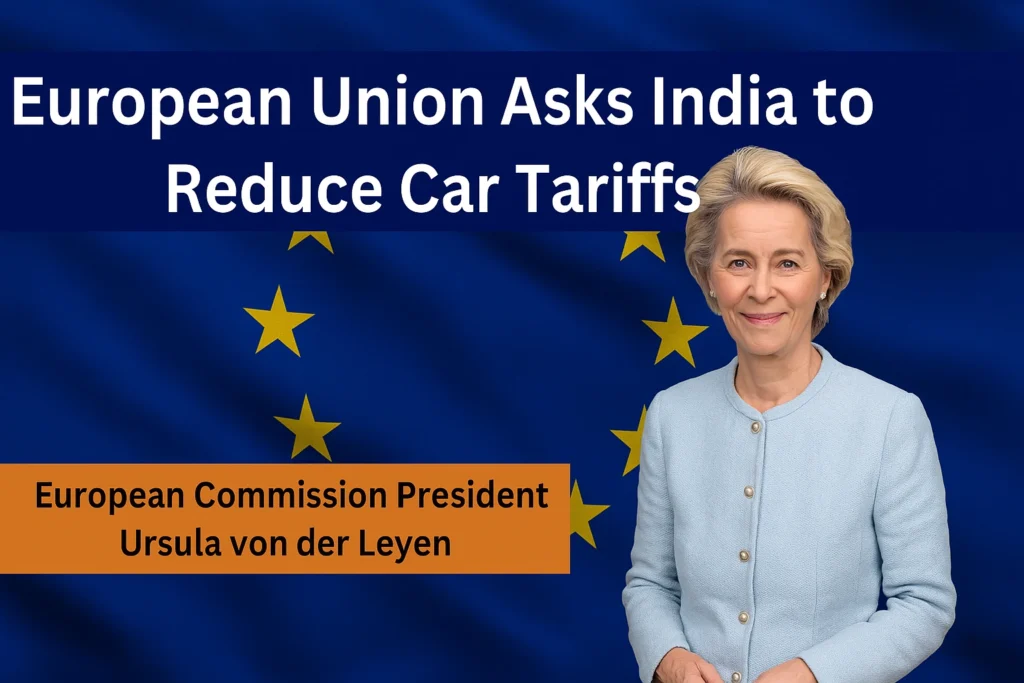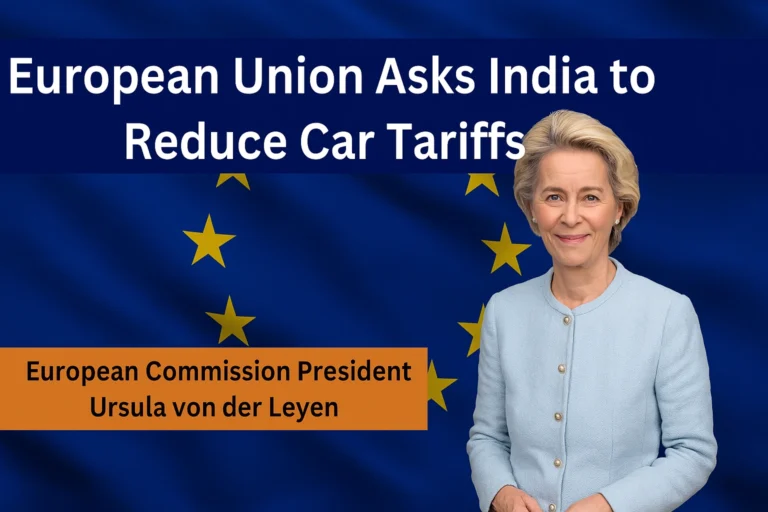European Union Asks India to Reduce Car Tariffs : The European Union (EU) is now pushing India to lower its steep import tariffs on cars, following a similar request made by the United States under President Donald Trump’s trade policies. This move has triggered a new wave of discussion around the long-stalled India-EU Free Trade Agreement (FTA), especially in light of India’s growing electric vehicle (EV) market and protectionist stance.

During a key meeting held on February 28, 2025, at Hyderabad House in New Delhi, Prime Minister Narendra Modi and European Commission President Ursula von der Leyen addressed critical trade issues, with car import duties taking center stage. According to a report by Reuters, India is now open to reducing car import tariffs from over 100% to 10% in a phased manner — a move that could significantly alter the Indian automotive landscape.
#OnReuters The tariff saga continues… now the EU wants zero tariff on India car imports and PM Narendra Modi's government is willing to sweeten its current offer to seal a trade deal. Scoop with @Acharya0122 @Reuters pic.twitter.com/a9FmCnVqVB
— Aditi Shah (@aditishahsays) April 7, 2025
Why the EU Wants Tariff Cuts from India
The EU’s call for lower import duties comes in response to Trump’s administration demanding more open access to foreign markets, including India. For European automakers like Volkswagen, Mercedes-Benz, and BMW, as well as American giant Tesla, reducing India’s car import tariffs would mean a golden opportunity to expand their market share in one of the world’s most protected auto sectors.
“For many of the key areas, the EU and India have different approaches, objectives,” said Olof Gill, spokesperson for the European Commission on trade. “This translates, in some cases, in different levels of ambition.”
Currently, imported cars face a tariff of over 100% in India — making foreign-made vehicles significantly more expensive for Indian consumers. A reduction to 10%, as proposed in the report, would make premium cars and EVs far more affordable and competitive.
What This Means for the Indian Car Market
India’s 4-million-unit-a-year car market is highly protective of domestic manufacturers. Companies like Tata Motors and Mahindra & Mahindra have invested billions in building indigenous manufacturing capabilities, particularly in the electric vehicle segment.
They argue that reducing tariffs sharply would:
- Undermine investments in local production
- Flood the market with cheaper imports
- Threaten the survival of domestic manufacturers
- Stall innovation and self-reliance goals
Domestic automakers are lobbying the Indian government to retain at least a 30% import duty, even if reductions begin. Moreover, they have requested no changes to EV import tariffs until 2029, followed by gradual cuts limited to specific import volumes.
Impact on Tesla and European Carmakers
For companies like Tesla, the timing couldn’t be better. Tesla is expected to begin selling its Berlin-made electric vehicles in India later this year. A reduction in tariffs would make its EVs more affordable and attractive to Indian buyers, giving the company a strong foothold in the emerging Indian EV sector.
Similarly, European brands like BMW, Mercedes, and Audi would benefit from greater market access, enabling them to increase exports without facing excessive taxes. This could also lead to:
- Increased competition in the premium car segment
- More choices for Indian consumers
- Improved adoption of global standards in safety and emissions
Trade Deal Timeline: Deal by End of 2025?
Negotiations between India and the EU over the FTA have been ongoing for over a decade. However, the recent push from both sides — and the geopolitical shifts triggered by U.S. tariffs have added urgency to the process.
According to the report, both India and the EU have agreed to finalize the trade deal by the end of 2025. If that happens, the deal could cover a wide range of sectors including:
- Automotive and auto components
- Clean energy
- Pharmaceuticals
- Textiles
- Information technology services
Domestic Resistance: Protecting the Make-in-India Vision
Despite growing international pressure, India’s domestic auto industry remains cautious. The Make-in-India initiative, which aims to boost local manufacturing, has been central to the government’s economic strategy.
Industry stakeholders argue that:
- Removing tariffs too soon would discourage global companies from setting up manufacturing plants in India
- Existing Indian EV makers would suffer unfair competition
- The sector needs at least four more years to become globally competitive
Instead of immediate cuts, many propose a phased reduction strategy, especially for EVs, beginning in 2029 and limited to controlled import volumes.
Strategic Implications for India’s EV Roadmap
The outcome of this tariff debate will play a crucial role in shaping India’s electric vehicle future. India aims to become a global EV hub, and balancing foreign investments with domestic capability building is a delicate task.
While lowering import duties can bring in high-end technology and increase EV adoption, it may also:
- Delay local innovation
- Hurt Indian startups in the EV space
- Disrupt plans by domestic players to expand capacity and lower costs
However, many believe that a balanced and phased approach could offer the best of both worlds affordable global tech for consumers, and sustainable growth for Indian industry.
Conclusion
As the EU joins the U.S. in pushing India for lower car tariffs, the Indian government faces a crucial decision. It must weigh the benefits of increased foreign trade against the risks to its homegrown manufacturing base. The next few months could determine whether India’s auto industry becomes more open to global players — or if it doubles down on protecting its domestic champions.
For now, the message is clear: the world wants access to India’s booming car market, and trade diplomacy is speeding ahead. Whether India will apply the brakes or shift gears remains to be seen.

